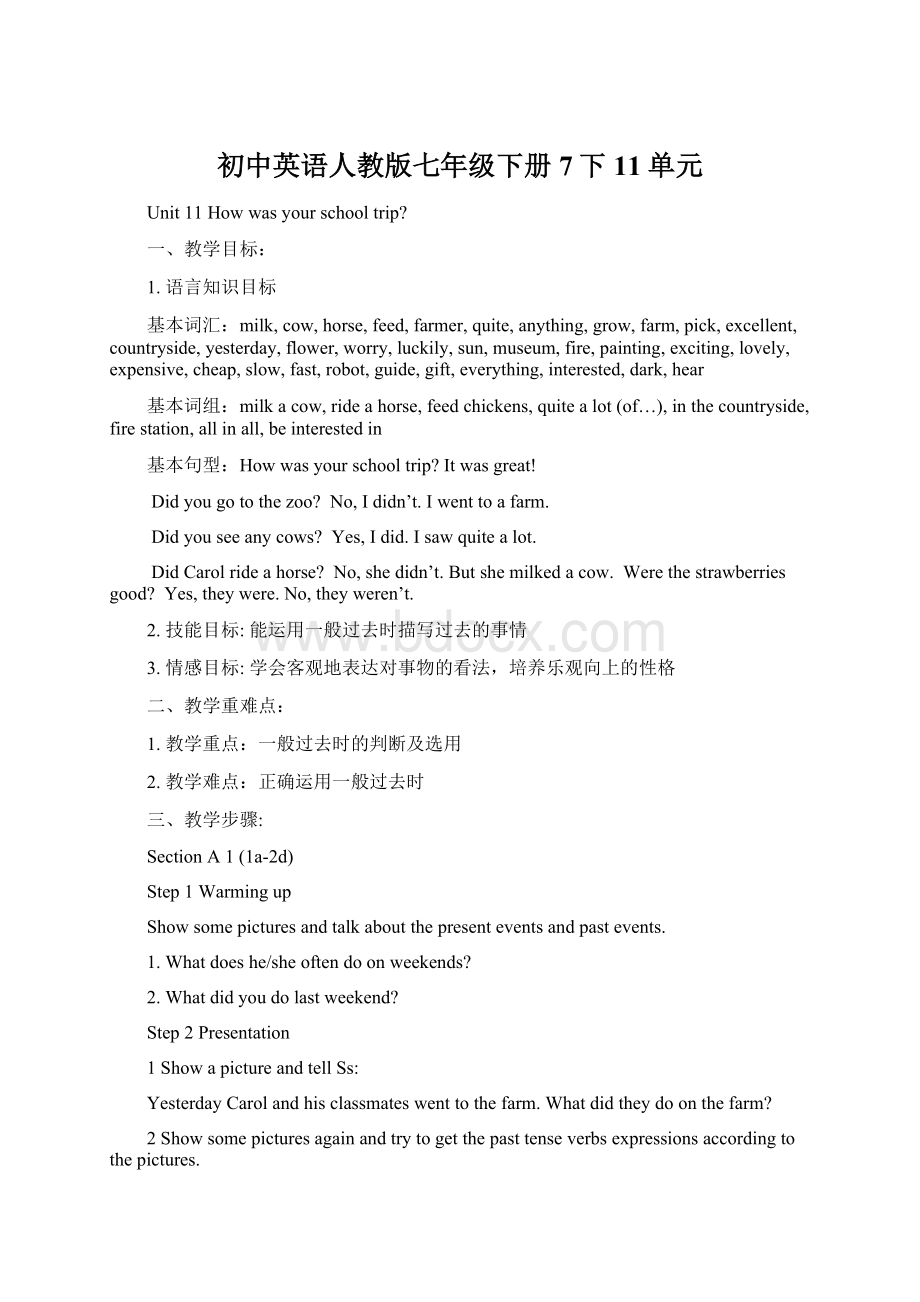 初中英语人教版七年级下册7下11单元.docx
初中英语人教版七年级下册7下11单元.docx
- 文档编号:5776701
- 上传时间:2023-01-01
- 格式:DOCX
- 页数:20
- 大小:306.67KB
初中英语人教版七年级下册7下11单元.docx
《初中英语人教版七年级下册7下11单元.docx》由会员分享,可在线阅读,更多相关《初中英语人教版七年级下册7下11单元.docx(20页珍藏版)》请在冰豆网上搜索。

初中英语人教版七年级下册7下11单元
Unit11Howwasyourschooltrip?
一、教学目标:
1.语言知识目标
基本词汇:
milk,cow,horse,feed,farmer,quite,anything,grow,farm,pick,excellent,countryside,yesterday,flower,worry,luckily,sun,museum,fire,painting,exciting,lovely,expensive,cheap,slow,fast,robot,guide,gift,everything,interested,dark,hear
基本词组:
milkacow,rideahorse,feedchickens,quitealot(of…),inthecountryside,firestation,allinall,beinterestedin
基本句型:
Howwasyourschooltrip?
Itwasgreat!
Didyougotothezoo?
No,Ididn’t.Iwenttoafarm.
Didyouseeanycows?
Yes,Idid.Isawquitealot.
DidCarolrideahorse?
No,shedidn’t.Butshemilkedacow.Werethestrawberriesgood?
Yes,theywere.No,theyweren’t.
2.技能目标:
能运用一般过去时描写过去的事情
3.情感目标:
学会客观地表达对事物的看法,培养乐观向上的性格
二、教学重难点:
1.教学重点:
一般过去时的判断及选用
2.教学难点:
正确运用一般过去时
三、教学步骤:
SectionA1(1a-2d)
Step1Warmingup
Showsomepicturesandtalkaboutthepresenteventsandpastevents.
1.Whatdoeshe/sheoftendoonweekends?
2.Whatdidyoudolastweekend?
Step2Presentation
1ShowapictureandtellSs:
YesterdayCarolandhisclassmateswenttothefarm.Whatdidtheydoonthefarm?
2Showsomepicturesagainandtrytogetthepasttenseverbsexpressionsaccordingtothepictures.
rodeahorse/milkedacow/fedchickens/talkedwithfarmers…
Step3Listeningandspeaking
1.Workon1a.Matchthephraseswiththepictures.
wentforawalkmilkedacow
rodeahorsefedchickens
talkedwithafarmertooksomephotos
过去式表示过去某个时间里发生的动作或状态。
1.一般过去式的动词通常用动词的过去式形式来表示;
2.动词的过去式是在动词原形的基础上变化的;
3.动词的过去式可分为规则动词和不规则动词;
规则动词和不规则动词示例:
规则:
milk--milked
不规则:
do--didfeed--fedride--rode
不规则动词变化没有固定的规律,需要逐个记忆;规则动词变化有规律。
2.Listentothetapeandanswerthequestion.
WheredidCarolgoonherschooltrip?
DidCarolseeanychickens?
3.Workon1b.ListenandcirclethethreethingsCaroldidonherschooltripin1a.
wentforawalkmilkedacow
rodeahorsefedchickens
talkedwithafarmertooksomephotos
4.Role-playtheconversation.
Bob:
Hi,Carol.Howwasyourschooltripyesterday?
Carol:
Itwasgreat!
Bob:
____yougotothezoo?
Carol:
No,Ididn’t.Iwenttoa_____.Look,herearemyphotos.
Bob:
Didyouseeany_____?
Carol:
Yes,Idid.Isaw_________.
Bob:
____yourideahorse?
Carol:
No,Ididn’t.ButI______acow.
Bob:
Didyoufeedanychickens?
Carol:
Well,I____somechickensbutI______feedthem.
Bob:
What____didyoudo?
Carol:
MyfriendsandI___forawalkaroundthefarmand____withafarmer.
5.Workon1c.AskandanswerquestionsaboutCarol’sschooltrip.
A:
DidCaroltakeanyphotos?
B:
Yes,shedid.
A:
DidCarolrideahorse?
B:
…
A:
DidCaroltalkwiththefarmer?
B:
…
Step4Languagepoints
1.Didyouseeanycows?
Yes,Idid.Isawquitealot.
quietalot+of+可数或不可数,也可以单独使用。
quitealittle“相当多,不少”+不可数名词
quiteafew“相当多,不少”+可数名词
e.g.Wedrankquitealotofwine.
我们喝了不少酒。
Isawquitealotofcows.
我看到了相当多的奶牛。
Iplaytennisquitealotinthesummer.
夏天我经常打网球。
Quiteafewstudentswerelate.
不少学生迟到了。
2.DidCaroltakeanyphotos?
卡罗尔拍照片了吗?
take与photo,picture等词搭配时,表示“拍摄,摄影”。
表示“拍摄某物或人”,就要在短语后面接介词“of”引入所拍摄的对象。
e.g.Thegirllikestotakephotosofherselfwithhercellphone.
这个女孩喜欢用她的手机自拍。
Step5Practice
1.WeknowthatCarolandherclassmateswenttothefarmfortheirschooltrip.Doyouwanttoknowmoreabouthertripanddoyouhavemorequestionsaboutthetrip?
Trytogiveyourquestions.
1)Didshehaveagoodtime?
2)Wasshehappy?
3)Whatdidshesee?
4)Didsherideahorse?
2.Workon2a.Listenandcheckthequestionsyouhear.
Whatdidthefarmersay?
Didyougrowanyapples?
Whatdidyousee?
Dotheygrowapples?
Didyoulearnanything?
Didyoueatthem?
Didyouaskhimanyquestions?
Weretheygood?
注意:
1)Dotheygrowapples?
农民是否通常种植苹果,属于经常性的情况,要用一般现在时,动词用原形或第三人称单数形式,疑问句中助动词用do/does。
其他问句都是问发生在过去的农场之行的所见所闻,要用一般过去时,动词用过去式,疑问句中助动词用did。
2)anything
anything作不定代词,可意为“某事;某东西”,常用在疑问句或否定句中。
something作不定代词,也可意为“某事;某东西”,常用在肯定句中。
如:
Ididn’tseeanythingintheroom.
我在屋子里什么也没看见。
Isawsomethingintheroom.
我在屋里看见一些东西。
anything作不定代词,还可意为“任何东西;任何事”。
如:
I’mhungry.I’lleatanything.
我饿了,随便吃什么都行。
将下列句子翻译成汉语。
1)Theteacherdidn’tsayanythingintheclass.
老师在班里什么也没说。
2)Iwanttoeatsomething.AnythingisOK.
我想吃点东西,什么都行。
3)Wecandosomethingtohelphim.
我们可以做点事帮助他。
3.Workon2b.Listenagain.CircleTfortrueorFforfalse.
1)ThefarmershowedCarolaroundthefarm.TF
2)Carollearnedalotaboutfarming.TF
3)ThefarmersgrowstrawberriesfromDecembertoJune.TF
4)Thefarmersdon’tgrowapples.TF
5)Carolpickedsomestrawberriesandtookthemhome.TF
4.Phrasesof2b
show(showed)sb.around带…...四周转转
grow(grew)strawberries种草莓
from…to…从……到……
pick(picked)strawberries摘草莓
take(took)sth.home带……回家
5.Workon2c.AskandanswerquestionsaboutCarol’svisittothefarm.
A:
WhatdidCaroldo?
B:
Shepickedsomestrawberries.
A:
Wasthefarmerfriendly?
B:
…
A:
WhatdidCarolsee?
B:
…
A:
Dotheygrowapples?
B:
A:
Whendotheypickapples?
B:
…
A:
WhatdidCarolpickonthefarm?
Applesorstrawberries?
Weretheydelicious?
B:
…
6.Practice.LetSstalkabouttheirschooltrip.
Step6Reading
1.Readtheconversationin2dandanswerthequestions.
WheredidEricgolastweekend?
Whydidhegothere?
Whatdidhedo?
Howwastheweatherthere?
Whatdidhedoatnight?
HowdidEricfeelaboutthetrip?
2.Role-playtheconversation.
3.Pairwork.
Askyourpartnerswhattheydidlastweek.
A:
Hi,LinFei.Whatdidyoudolastweekend?
B:
IwatchedTV,andthenIwentfishingwithmyfather.
A:
Howwasyourlastweekend?
B:
Itwasgreat.
Step7Languagepoints
1.Ivisitedmygrandparentsinthecountryside.
名词country和countryside都有“乡村;农村”的意思,往往与限定词“the”搭配连用,尤其是country。
e.g.Wespentapleasantdayinthecountryside.
但country可用作形容词,置于名词前做定语,而countryside一般不这么用。
如:
countrymusic,countryroad。
2.Itwassomuchfun.
fun表示“有趣的事情”,为不可数名词。
e.g.Look,Peter.Thechildrenarehavingsomuchfun.
3.Luckyyou!
你真幸运!
这是一句非正式口语,相当于You’resolucky.
Lucky之后的人称还可以改为me,him
Step8Exercises
Ⅰ.根据句意及所给图片提示,用恰当的短语完成下列句子。
1.Eric_______________justnow.
2.LastSundayI________________.
3.Mysister______________thismorning.
4.Helen’sbrother_________________yesterday.
II.根据汉语意思完成下列英语句子或对话。
1.他有许多朋友。
Hehas________________friends.
2.我爷爷刚才去散步了。
Mygrandpa________________justnow.
3.——昨天你们去动物园了吗?
——是的,我们去了。
—_____you____tothezooyesterday?
—Yes,___________.
4.——彼得买香蕉了吗?
——不,他没买。
—______Peter______anybananas?
—No,___________.
Step9Homework
1.Rememberthelanguagepointsinthislesson.
2.Finishtheexercisesinworkbook.
Step6:
GrammarFocus(GetSsreadaloud)
Howwasyourschooltrip?
Itwasgreat!
Didyougotothezoo?
No,Ididn’t.Iwenttoafarm.
Didyouseeanycows?
Yes,Idid.Isawquitealot.
DidCarolrideahorse?
No,shedidn’t.Butshemilkedacow.
Werethestrawberriesgood?
Yes,theywere.No,theyweren’t.
SectionA2(Grammarfocus-3b)
Step1Revision
Askyourpartner:
WhatdidCaroldoonherschooltrip?
Thenfillinthefollowingchartandgiveareport.
WhatdidCaroldoonherschooltrip?
wenttoafarm
milkedacow
talkedwithafarmer
Lastweek,Carolandherclassmateshadaschooltrip.Theywenttoafarm.Shemilkedacow.…
Step2GrammarFocus
Completethesentences.
1.你的学校旅行怎么样?
_____________________________
2.非常棒!
______________________________
3.你去动物园了吗?
_____________________________
4.不,我没有去。
我去了农场。
__________________________
5.你看到奶牛了吗?
__________________________
6.是的,我看到许多。
__________________________
7.卡罗尔骑马了吗?
__________________________
8.不,她没有。
但是她给挤牛奶了。
________________________________
9.草莓好吃吗?
________________________
10.是的,好吃。
_________________________
11.不,不好吃。
_________________________
Step2Grammar
1.一般过去时知识结构
2.系动词和一般过去时
am(is)→wasare→were
陈述句:
Hewasathomeyesterday.
否定句:
Hewasn’tathomeyesterday.
疑问句:
Washeathomeyesterday?
Yes,hewas./No,hewasn’t.
3.行为动词的一般过去时
陈述句:
主语+动词过去式+其它
Igotothemovie.→Iwenttothemovie.
否定句:
主语+助动词didn’t+动词原形+其它
Idon’tgotoschooltoday.→Ididn’tgotoschool.
一般疑问句:
Did+主语+动词原形+其它?
Doyouhavebreakfast?
→Didyouhavebreakfast?
Yes,Ido./No,Idon’t.Yes,Idid./No,Ididn’t.
4.规则动词过去式的构成
构成规则
原形
过去式
一般在动词原形末尾加-ed
work
play
worked
played
结尾是e的动词加-d
hope
live
hoped
lived
末尾只有一个辅音字母的重读闭音节词,先双写这个辅音字母,再加-ed
stop
trip
stopped
tripped
结尾是“辅音字母+y”的动词,先变“y”为“i”再加-ed
study
worry
studied
worried
过去式规则变化规律为“直”“双”“改”
直指的是普通的直接加ed,以e结尾的直接加d;
双指的是“辅+元+辅”的单词双写词尾再加ed;
改指的是以y结尾的y前是辅音,改y为i再加ed。
5.规则动词过去式词尾-ed的读音
读音规则
读音
例词
在浊辅音和元音后面
/d/
moved/mu:
vd/
在清辅音后面
/t/
passed/pa:
st/
在/t/,/d/后面
/Id/
needed/'nI:
did/
Regularverbs
Irregularverbs
play→
visit→
climb→
study→
worry→
stop→
do→
is→
are→
have→
eat→
buy→
Step3Task
1.AskSstoreadandcompletethelettersin3a.
HereisJim’sandBill’sletters.Let’shelpthemtocompletetheletters.
DearBill,
How___(is)yourschooltripyesterday?
___(Do)you___(go)tothezoo?
___(do)youtakeanyphotos?
___(Do)you___(see)anyinterestinganimals?
I____(go)tothezoolastyearandit____(is)alotoffun.
Jim
DearJim,
Myschooltrip___(is)great!
We___(have)somuchfun!
We____(go)toGreenPark.We_______(climb)themountainsthereand____(see)alotofflowers.We___(eat)ourlunchundersometreesand______(play)somegamesafterthat.Butatabouttwoo’clock,it____(get)verycloudy
- 配套讲稿:
如PPT文件的首页显示word图标,表示该PPT已包含配套word讲稿。双击word图标可打开word文档。
- 特殊限制:
部分文档作品中含有的国旗、国徽等图片,仅作为作品整体效果示例展示,禁止商用。设计者仅对作品中独创性部分享有著作权。
- 关 键 词:
- 初中英语 人教版七 年级 下册 11 单元
 冰豆网所有资源均是用户自行上传分享,仅供网友学习交流,未经上传用户书面授权,请勿作他用。
冰豆网所有资源均是用户自行上传分享,仅供网友学习交流,未经上传用户书面授权,请勿作他用。


 铝散热器项目年度预算报告.docx
铝散热器项目年度预算报告.docx
